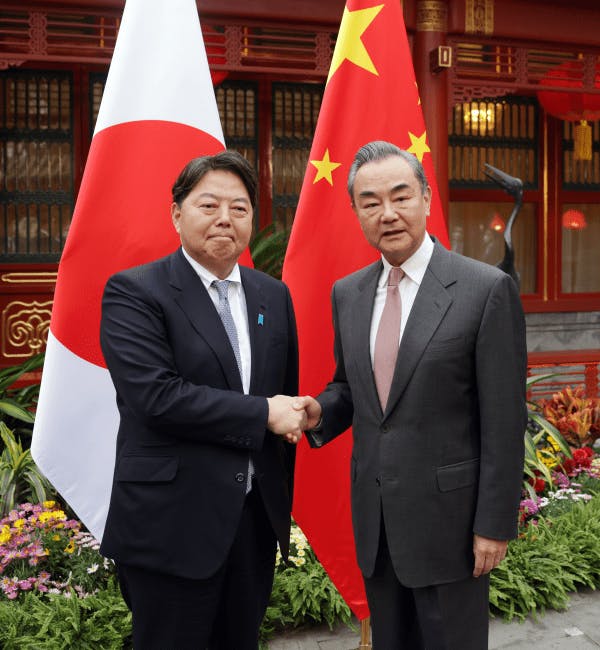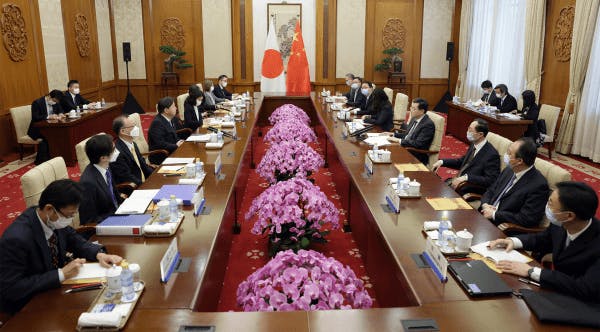4月1日至2日,應中國外長兼國務委員秦剛邀請,日本外相林芳正對中國進行為期兩天的訪問,這在1978年8月的《中日和平友好條約》締結45周年之際。對中日關係發展具有重大意義,值得我們密切關注。
林芳正的訪問,適逢近年來中日關係因一連串問題而惡化的關鍵時刻。
中日關係惡化
首先,隨着所謂的「中國威脅論」在以美國為首的一些發達國家中迅速升溫,日本已經自願或不情願地被拖入這樣一個唯美國馬首是瞻的聯盟,其中包括AUKUS(由澳洲、英國、日本和美國組成的防衛合作協議)和QUAD(美國、印度、澳洲和日本組成的四方安全對話)。 這些地區安全組織被中國視為美國「遏制」北京計劃的一部分。
其次,從日本的角度來看,中俄關係的密切,中國在南海的軍事活動,中國海警在有爭議的釣魚島(日本稱為「尖閣諸島」)海域附近巡邏,中國對台灣的軍事威脅,去年佩洛西訪問台灣後中方發射導彈,據報道有幾枚導彈落入日本海域,以及中國解放軍的迅速擴張和能力提升,從安全角度來看,東京感到相當不安。因此,東京自然比以往任何時候都更靠攏以美國為首的軍事和安全聯盟。
第三,近期日本部分政客涉台言論和活動,似乎刺激了大陸官員的政治心理。日本一些政客公然鼓吹加強日台軍事關係,令中國大陸方面感到日本一些權力精英鼓吹與台灣締結軍事條約,這有可能違反「一中」原則。
第四,中國大陸政府最近以涉嫌從事間諜活動為由逮捕安斯泰來製藥公司的一名日本高管,加劇了中日關係緊張。據報道,從2015年至今,至少有17名日本人因涉嫌從事間諜活動在中國被捕和拘留,這種現像不利於中日關係的和諧發展。
第五,3月31日,日本政府宣布,為防止高技術外洩和轉移到其他國家用於軍事用途,對6種23項精密半導體產品的出口實施管制。儘管日本有關經濟官員指出,該措施並未針對任何特定國家,但外界普遍認為這與美國試圖遏制中國半導體製造能力的做法相呼應。針對日本政府限制半導體製造技術出口,中國外交部發言人毛寧3月31日表示,全球晶片產業鏈供應鏈的形成和發展,是市場規律和企業選擇共同作用的結果,將經貿和科技問題政治化、工具化、武器化,人為破壞全球產供鏈的穩定,這種行為只會損人害己。 顯然,北京認為東京的經濟措施是針對中國大陸的。
儘管如此,中方在林芳正來訪之前表現了積極的姿態。北京方面的兩個舉動,是一種溫暖的姿態,有望實現中日關係發展的突破。

中方表現積極 期望關係回暖
3月31日,中國國防部宣布中日防務部門海空聯絡機制直通電話線路建設完成,這是一個中日關係趨於正常化和穩定十分積極的一步。根據中國國防部的說法,雙方可以而且將會進行直接電話溝通,以管控雙方的海空危機,從而「維護地區和平穩定」。
這一消息適逢中國外交部透露林芳正於4月1日至2日訪問中國兩天。顯然,中方已經向日方做出了一些積極的姿態。作為一個非常注重面的國家,中方的積極舉動必須引起日方重視。
關於建立軍事熱線以管控任何軍事危機的討論可以追溯到2007年,當時中日兩國都曾有過這樣的想法。然而,2012年,日方突然將釣魚島「國有化」,使中日關係陷入前所未有的緊張局面。問題的癥結在於,日本一些右翼政客的一些突如其來的舉動,挑戰了中日關係的和諧。幸運的是,日本已故首相安倍晉三後來通過艱苦的外交努力和個人的微妙手腕,着力改善了中日關係。
林芳正的訪問具有外交意義,因為這是繼日本外相茂木敏充於2019年12月訪問中國後,日本外相首次訪華。林芳正的訪華可以被視為一個潛在的破冰事件,有望為2023年8月迎來《中日和平友好條約》締結45周年營造良好氛圍。
中方此次做出的第二個積極姿態,是外長秦剛主動邀請日本外相林芳正訪問北京。在亞洲政治和外交實踐中,姿態不僅具有象徵意義,且具有極強的政治意義,顯示中國願意與日本就一系列問題進行討論。
林芳正訪華的有趣之處在於中共中央外事辦主任、前外交部長王毅4月1日突然表態,對「日本對華政策可能的倒退感到憂慮」。如果政治姿態對我們理解外交信號至關重要,那麼王毅的言論意味着中國和日本將不得不制定解決方案以盡量減少分歧。有意思的是,林芳正在訪華前還公開表示,將在與中方會談時向中方說明日方的關切。
另一個有趣的現象是,3月31日,中國外交部網站發表了一篇關於王毅會見日本前首相福田康夫的文章。王毅讚揚福田為改善中日關係所作的貢獻。此外,正是福田康夫的父親福田赳夫在1978年與已故的中國國務院副總理鄧小平簽署了《中日和平友好條約》。
在中國外交策略中,人際關係是外交關係取得突破的極其重要的資產。因此,中國官方對福田康夫和福田赳夫的讚賞,具有重要意義,表明中國渴望與日本共同努力,促進中日關係正常化及進一步發展。
事實上,福田康夫在中國的評論一直用非常正面的外交語言。他在博鰲論壇上表示,中國為解決地區衝突和問題人作出了努力,中國的經濟全球化工作可以為混亂的世界帶來「信心和預見性」。福田補充說,日中兩國應加強相互交流和溝通,減少誤解和誤判,促進亞洲地區的和平與發展。可以說,福田的表態比日本一些政客的外交語言要高明得多,後者往往採取不利於日中關係發展的「擴音器外交」。
知華派與鷹派的競爭
事實上,日本首相岸田文雄和外相林芳正被一些中國大陸觀察家認為是「知華」的日本政治家。 然而,在日本自民黨內部和日本政壇,不時有一些政治精英傾向於對華強硬,將北京視為真正的軍事、經濟和政治「威脅」──一種與美國對北京的主流看法平行的「威脅」認知。如果是這樣,即使東京的執政政治集團由更「知華」的成員組成,它也可能不得不通過對北京採取明顯「強硬」的立場,來安撫另一個更「鷹派」的集團。
美國及其盟友與中國之間的地緣政治鬥爭,使東京幾乎沒有外交迴旋餘地。在釣魚島的主權爭議方面,日本自然地採取了堅定的立場──這一現像或許與東京對台灣未來的看法相同,由於1895年至1945年日本統治過台灣,因此右翼政客對台灣的看法,帶有一種影響日本的歷史懷舊和情感紐帶。在這些複雜的地緣政治形勢下,中日關係進一步發展存在嚴重的結構性制約。
對於「中國威脅」的認知,福田康夫在2021年10月發表了精闢的言論,他說:「如果鄰國是敵國,日本想盡辦法也保護不了自己,但最重要的是我們不應該樹敵。」避免樹敵,或許是東京部分權力精英所忽視的一種洞察力。總而言之,儘管中日關係的和諧發展存在結構性地緣政治制約,但北京和東京都有機會實現破冰──解凍近期「惡化」的關係。 中方的積極姿態有望得到日方的回報──如果這種外交信號仍然準確的話。
Hayashi’s visit to China and its implications on Sino-Japanese Relations
The two-day visit of the Japanese Foreign Minister Yoshimasa Hayashi to China at the invitation of the Chinese Foreign Minister and State Councillor Qin Gang from April 1 to 2 deserves our close attention, because it has tremendous implications on the development of Sino-Japanese relations in the 45th anniversary of the signing of the Sino-Japanese Treaty of Peace and Friendship in August 1978.
Hayashi’s visit occurs at a critical juncture when the relations between Japan and China have deteriorated in the recent years due to a number of issues.
First and foremost, as the so-called “China threat” is rapidly gaining currency in a group of developed countries led by the United States, Japan has been dragged willingly or unwillingly into such a US-led alliance, including the AUKUS (composed of Australia, UK, Japan and US defence cooperation pact) and QUAD (security dialogue between US, India, Australia and Japan). These regional security organizations have been seen by China as part of the US scheme to “contain” Beijing.
Second, from Japan’s perspective, the closer relations between China and Russia, the Chinese military activities in the South China Sea, the Chinese marine police patrol near the waters of the disputed Diaoyu Island (Senkaku Island from Japan’s perspective), the military threat of China toward Taiwan, the firing of Chinese missiles after the Nancy Pelosi’s visit to Taiwan last year during which a few missiles were reportedly falling into Japanese waters, and the rapid expansion and improved capability of the People’s Liberation Army have made Tokyo quite uncomfortable from the security perspective. As such, Tokyo has been naturally driven closer to the US-led military and security alliance than ever before.
Third, the recent remarks and activities made by some Japanese politicians on Taiwan have appeared to stimulate the political psyche of the mainland Chinese officials. Some Japanese politicians have openly advocated for a closer military relationship between Japan and Taiwan, making the mainland Chinese side feel that some power elites in Japan have advocated a military pact with Taiwan that could have violated the one-China principle.
Fourth, a recent arrest made by the mainland Chinese government of a Japanese businessman in Astellas Pharma for alleged espionage activities has exacerbated the Sino-Japanese relations. From 2015 to the present, it was reported that at least 17 Japanese were arrested and detained in China for their alleged spying activities – a phenomenon not conducive to the harmonious development of Sino-Japanese relations.
Fifth, on March 31, the Japanese government announced that it imposes control on the export of six types and 23 items of sophisticated semiconductor production for the sake of preventing the leakage and transfer of high technology to other countries for military usage. Although the Japanese economic officials concerned pointed out that the measure did not target at any specific country, it was widely perceived to be in conformity with the US attempt at curbing the Chinese capability to manufacture semiconductors. In response to the Japanese government’s restriction of the export of semiconductor manufacturing technology, Mao Ning, a spokeswoman of the Chinese Foreign Ministry, said on March 31 that the global logistic supply chain of semiconductors is a result of market operation and choices from enterprises, and that any control would politicize and weaponize the stability of global logistic supply chain. Clearly, Beijing perceives Tokyo’s economic measure at targeting at mainland China.
Still, the Chinese side expresses its positive gesture just prior to Hayashi’s visit. Two moves were made on the Beijing side as warm gestures that hopefully can and will achieve a breakthrough in the development of Sino-Japanese relations.
On March 31, the Chinese Defence Ministry announced that a direct liaison hotline has been established between China and Japan – a very positive step toward the normalization and stabilization of Sino-Japanese relations. According to the Chinese Defence Ministry, both sides can and will have direct phone communications for the sake of controlling any maritime and aerial crisis, thereby “protecting the regional peace and stability.”
This announcement coincided with the Chinese Foreign Ministry’s revelation that Hayashi would visit China for two days from April 1 to 2. Clearly, the Chinese side has made some positive gestures to the Japanese side. As a country that places a heavy emphasis on face, China’s positive moves must be taken seriously by the Japanese side.
The talk about setting up a military hotline to control any military crisis could be traced back to 2007 when both China and Japan toyed with such an idea. However, in 2012, the sudden “nationalization” of the Diaoyu Island (Senkaku Island) from the Japanese side plunged the Sino-Japanese relations into an unprecedented tense situation. The crux of the problem was that some right-wing politicians in Japan made some sudden moves that challenged the harmony of Sino-Japanese relations. Fortunately, the late Japanese Prime Minister Shinzo Abe took pains at improving Sino-Japanese relations later through his strenuous diplomatic efforts and personal subtle finesse.
Hayashi’s visit is diplomatically significant as it is the first visit made by the Japanese Foreign Minister to China after the last visit by the Japanese Foreign Minister Motegi Toshimitsu in December 2019. The Hayashi visit can be seen as a potentially ice-breaking event that would hopefully bring about a good climate leading to the 45th anniversary of the Sino-Japanese Treaty of Peace and Friendship in August 2023.
The second positive gesture made by China this time was the initiative made by Foreign Minister Qin Gang to extend his invitation to his Japanese counterpart Hayashi to visit Beijing. In Asian politics and diplomatic practices, gestures are symbolic but extremely politically meaningful, with the implication that China is willing to discuss with Japan on a whole range of issues.
What is interesting in Hayashi’s visit is that State Councillor and former Chinese Foreign Minister Wang Yi suddenly remarked on April 1 that he is “worrying” about the development of Sino-Japanese relations. If political gestures are critical for us to understand diplomatic signs, Wang’s remarks meant that China and Japan would have to hammer out solutions to minimize their differences. Interestingly, Hayashi before his visit to China also indicated openly that Japan would delineate its concerns to the Chinese side during his talks with the Chinese counterpart.
Another interesting sign was that, on March 31, the Chinese Foreign Ministry’s website published an article on Wang Yi’s meeting with the former Japanese Prime Minister Yasuo Fukuda. Wang praised Fukuda’s contributions to the improvement of Sino-Japanese relations. Furthermore, it was Yasuo Fukuda’s father, Takeo Fukuda, who had signed the Sino-Japanese Treaty of Peace and Friendship with the late Chinese Vice Premier Deng Xiaoping in 1978.
In Chinese diplomatic statecraft, personal relations are an extremely important asset that can lead to breakthrough in diplomatic relations. As such, the official Chinese praise heaped on Yasuo Fukuda and Takeo Fukuda has a significant meaning that China is eager to work with Japan on the normalization and further development of Sino-Japanese relations.
In fact, Yasuo Fukuda’s comments in China have been very positive and diplomatic. He said in the Boao Forum that China has made efforts at solving the regional conflicts and problems, and that its economic globalization work can bring about “confidence and predictability” to the chaotic world. Fukuda added that Japan and China should strengthen mutual interactions, communications and reduce misunderstanding and miscalculations, leading to the Asian region’s peace and development. Arguably, Fukuda’s comments are far more diplomatic than some Japanese politicians, who tend to adopt a megaphone diplomacy unfavourable to the development of Sino-Japanese relations.
In fact, the Japanese Prime Minister Fumio Kishida and Foreign Minister Yoshimasa Hayashi are regarded by some mainland Chinese observers as those Japanese politicians who “understand China.” However, inside the Japanese Liberal Democratic Party and in the Japanese political arena, from time to time some political elites tend to be more hawkish toward China and see Beijing as a real military, economic and political “threat” – a “threat” perception parallel to the dominant US view of Beijing. If so, even the ruling political grouping in Tokyo is composed of members who are more “understanding” toward China, it may have to placate the other more “hawkish” grouping by adopting an apparently “hard-line” position toward Beijing.
The geopolitical struggles between the US allies and China have rendered Tokyo little room for diplomatic manoeuvre. On the Senkaku Island’s sovereignty dispute, Japan naturally adopts its firm position – a phenomenon perhaps the same as how Tokyo perceives the future of Taiwan where the Japanese rule lasted from 1895 to 1945 with a kind of historical nostalgia and emotional bond that affect some Japanese right-wing politicians’ view of Taiwan. Under these complex geopolitical circumstances, there are severe structural constraints on the further development of Sino-Japanese relations.
On the perception of the “China threat,” Yasuo Fukuda made an insightful remark in October 2021, when he said that “If a neighbour is an enemy country, whatever Japan tries its best cannot protect itself, but the most important matter is that we should not create enemies.” Avoiding the creation of enemies is perhaps an insight that has been neglected by some power elites in Tokyo.In conclusion, despite the structural geopolitical constraints on the harmonious development of Sino-Japanese relations, there are opportunities for both Beijing and Tokyo to achieve an ice-breaking thaw in the recently “worsening” relationships. The positive gestures made by the Chinese side are expected to have reciprocal returns from the Japanese side. If this diplomatic symbolism remains accurate, the release of the Japanese
原刊於澳門新聞通訊社(MNA)網站,本社獲作者授權轉載。原文網址:https://www.macaubusiness.com/opinion-hayashis-visit-to-china-and-its-implications-on-sino-japanese-relations/



































